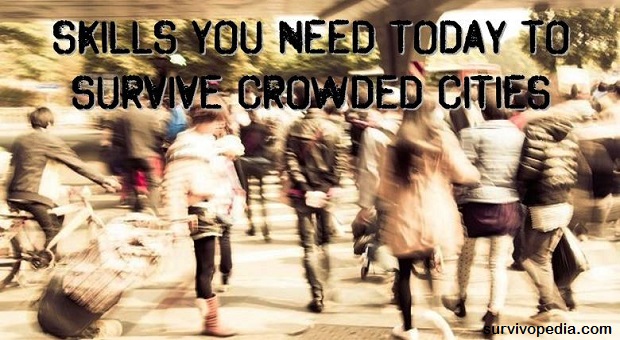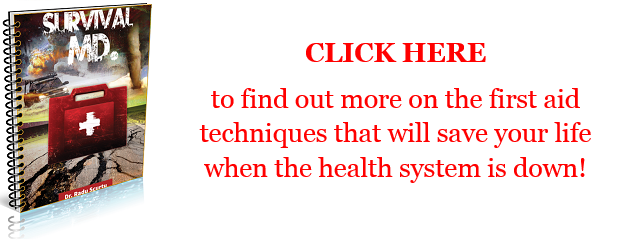
Knowing how to react in a hairy situation, including how to keep your calm and avoid panicking will make all the difference in the world. Fear is the mind-killer and to conquer fear you must have confidence in yourself.
Hence, acquiring the basic skills for survival, especially in a crowded city, will give you confidence, balance and peace of mind. Survival in our modern and crowded cities has become more of an art form nowadays; it’s the science of “minding your own business”. But what would be the secrets of a true urban survivalist?
Be Aware and Beware!
One of the most important skills an urban survivalist must achieve is situational awareness. Basically, you must know what’s going on around you at all times and have a reaction plan for responding to an abnormal situation. You have to anticipate the next move and learn to think ahead in hairy situations.
Situational awareness in urban environments means that you must be constantly looking for signs of dangers and threats wherever you go. Crimes happen especially during the night, in quiet and dark areas, like alleys, garages, lonely roadways, stairs etc. Try to avoid these places and also learn to trust your gut instincts. Whenever there’s a doubt, there is no doubt!
Basically, you must avoid being lulled into that false sense of security and prosperity that our ultra-high tech nanny-state society tends to drive into your psyche.
Learn how to defend yourself. You can always choose to carry a weapon for self-defense: a gun, a knife, a pepper spray or whatever. Learn how to use it efficiently.
Remember thatattitude when threatenedis essential: don’t act like a potential victim and don’t show that you feel vulnerable.
Avoiding conflicts is preferable to walking into dangerous situations, always. It’s better to withdraw quietly and unobtrusively than to fight, unless it’s absolutely necessary.
I think that it’s of crucial importance to learn how people react under stress, to learn body language (from your friends and co-workers for example) if you want to avoid getting into trouble. Learn to trust your instincts, stay cool and alert at all times and learn to evaluate the risks when you’re heading to unfamiliar areas.
To avoid getting mugged or robbed, you should try to use public transportation instead of walking when possible for two reasons: there’s safety in numbers and the bright lights and video surveillance in these places tend to deter criminals most of the time. Keep your wallet safe from thieves in inconspicuous places as opposed to your back pocket. Try to avoid crowds and steer clear of commotions; usually they’re a distraction for pickpockets. Use a money belt instead of a wallet and never count money in public.
Also, if you’re taking a stroll down the street and you see suspicious “goons” walking toward you, just jaywalk, get out of there and be prepared to run away if necessary.
Know your neighborhood well; get acquainted with your neighbors and you’ll easily observe people that don’t belong in your area.
Learn how to cross the streets safely. Only cross in designated places and try to make eye contact with the driver, to make sure that he saw you. Make it obvious that you’re trying to cross the street and check for oncoming cars from both directions before starting to cross the street.
Learn how to take precautions when parking your vehicle, thus avoiding car theft or vandalism. Always park your car in well-lit, visible locations, get yourself an anti theft device or car alarm (at least display an alarm sticker in the window), remove any valuables from plain sight and always lock the doors. Avoid very crowded parking areas; attended parking lots or streets are the safest.
Be aware of what’s going on not only in the place that you live but world-wide as well. Try to educate yourself about the global economy and financial systems.
Be street smart and world smartat the same time.
Saving Your Money, Time and Energy
Saving, as a mental tool and as a belief system, is prepping in its highest and purest form. You should analyze carefully every decision that you make, to fully understand all the ramifications of your actions when it comes to a (potential) survival situation.
A saver’s mindset is a prepper’s mindset. Saving is crucial when it comes to any survival scenario. If you can stretch your resources for as long as possible, if you can live on very little, you’ll be able to survive on this planet the longest.
When it comes to shopping, you should be aware of the fact that sometimes people give away good stuff over the internet. There are two places you should check out often:
- Freecycle is a great place to find everything from free food to furniture and building supplies. If you’re a subscriber to their daily emails, you can make a killing in savings here. If you’re good at talking to total strangers, you’ll be able to get for free all sorts of things.
- The second place for getting freebies over the internet is the free section on Craigslist; here you can also get useful stuff for free.
Along with Craigslist and Freecycle, you should consider discount and dollar stores for your shopping endeavors. Truth be told, dollar stores are not known for the extraordinary quality of their products, but if you’re careful and keep your eyes peeled, you can find some pretty good deals in those places. You’ll be able to find low prices on soap, toothpaste, deodorant, bandages, antibacterial ointment, twine, non-perishable foods etc.
Don’t forget one of the basic rules in life: everything is a negotiation. Anything can be negotiated, especially when it comes to buying or bartering stuff.
Don’t be ashamed to ask for discounts, especially when you’re buying from private people or small companies (mom and pop establishments). You will be pleasantly surprised to find out that sometimes people will drop the price for no apparent reason, but keep in mind that the art of negotiation consists in offering a plausible reason for a price drop. Most of the time, that’s the “back and forth” game.
Anything can be a reason for a discount: buying an already opened item, buying large quantities of “stuff”, buying a damaged item (scratched, with small or minor defects that don’t impair its overall usability), buying items which are close to the expiration date or even expired etc.
A good example of negotiating a better deal is when you’re cruising farmer’s markets. Let’s say that one of something is 50 cents; well, just ask the farmer for a sweet deal: three for $1. If you become a master in the fine art of negotiating, you can safely say that you’re one step closer to becoming a true urban survivalist.
You can also save money at the pump buying gas from membership stores that have discounted gas prices for members: Sam’s Club, Costco or BJ’s Wholesale club. Also, pay cash because some gas stations charge extra for credit card sales and use smartphone apps like GasBuddy or Cheap Gas for listing gas stations and prices near you.
Check out for grocery store partnerships (some have gas discount programs along with their loyalty programs, Kroger and Ralphs for example), use gas reward credit cards like PenFed Platinum Cash Rewards.
Save time and money by skipping rush-hours (there’s one in the morning and one in the afternoon when people go to and come home from work). The same story goes for avoiding hypermarket cues; usually people crowd the markets after working hours and in weekends (especially in the morning).
Preparing Your Journey
Be as tough as you can. Toughness doesn’t mean being physically strong or having a good tolerance to pain. A tough prepper should be able to withstand harsh environments without whining and without losing his or her survival abilities.
I’m talking about boot camp toughness. Like fasting on Fridays, going hiking or running when it’s snowing or cold outside, getting up early in the weekends and working outside even if you have a cold.
Basically, you should be able to remain functional and perform well when you’re in a tight spot and you don’t benefit from all the comforts and luxuries of our (currently functioning) modern society.
Learn discipline and find your freedom; for example, don’t talk at work unless someone asks you a direct question. Get tough using incremental steps.
Start with being uncomfortable when it comes to little things in life (don’t use the AC in the car or the heater in the winter) and go from there; choose the “hard way” when doing physical activity, stop being lazy, don’t get distracted and don’t get spoiled.
Don’t be negative, don’t criticize everything, be a part of the solution and not a part of the problem; choose adversity over comfort i.e. walking over driving when possible, dumbbells over machines, running outside over the treadmill and so on and so forth.
Don’t be an attention whore when you’re out on the streets, blend in instead. Don’t dress ostentatiously, don’t wear expensive jewelry etc.; trying to get noticed is counter-productive in terms of urban survival.
All these things will help you to survive in crowded cities.
Oh, and always remember this thing: prepping is not about the destination, it’s about the journey.
Do you have any city survival tips that you’d like to share? If so, we’d love to read them in the comments section below.
This article has been written by Chris Black for Survivopedia.
About Chris Black
Chris Black is a born and bred survivalist. He used to work as a contractor for an intelligence service but now he is retired and living off the grid, as humanly possible. An internet addict and a gun enthusiast, a libertarian with a soft spot for the bill of rights and the Constitution, a free market idealist, he doesn’t seem very well adjusted for the modern world. You can send Chris a message at chris.black [at] survivopedia.com.






